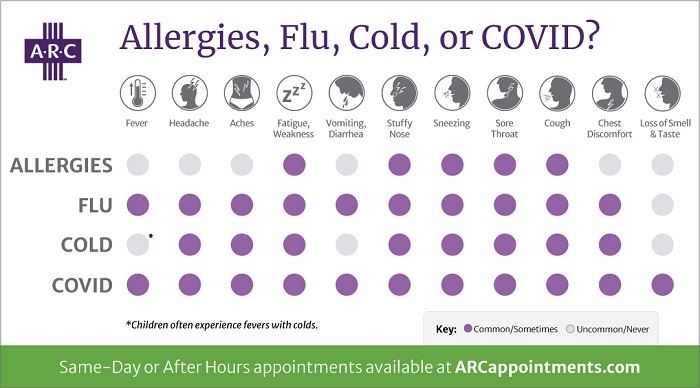This time of year, it is often difficult to figure out why you feel bad. Is it allergies? A cold? The flu? COVID-19? The symptoms for these illnesses often overlap, making it difficult to diagnose yourself.
Allergies, cold, flu, or COVID-19?
However, there are a few distinguishing characteristics that may help you determine what you are experiencing:
- Allergies — Allergy symptoms typically include itchy or watery eyes, runny or stuffy nose, sneezing, and a scratchy throat. Allergy symptoms usually last as long as the person is exposed to the allergen.
- Cold — Cold symptoms tend to develop gradually over a few days and typically include a runny or stuffy nose, sneezing, sore throat, and cough. Fever is uncommon in a cold.
- Flu — Flu symptoms tend to come on suddenly and can include a fever, body aches, chills, fatigue, cough, and sore throat. The flu can also cause gastrointestinal symptoms, such as nausea, vomiting, and diarrhea.
- COVID-19 — COVID-19 symptoms can range from mild to severe, and can include fever or chills, cough, shortness of breath or difficulty breathing, fatigue, muscle or body aches, headache, new loss of taste or smell, sore throat, congestion or runny nose, nausea or vomiting, and diarrhea.
Because many symptoms for these four illnesses can be similar, when in doubt, find out. In other words, you should rely on your doctor to make a diagnosis.

Common causes of allergies
"Allergies are when your body thinks that a pollen or a pet dander is a dangerous invader and it's trying to expel that invader from your body," says Elisabeth A. Clayton, MD, Allergy and Asthma at ARC Bee Cave and ARC Far West Medical Tower. "It does that by creating inflammation which is swelling and itching and redness and mucus and all the nasty stuff you think about as an allergy."
Some common causes of allergies include:
- Pollen
- Mold
- Dust mites
- Insects
- Pet dander
Treatments for allergies
Allergies can be a frustrating and uncomfortable experience. Dr. Clayton advises, "The best thing is to be really proactive about treating the allergies."
Here are some tips to help reduce your symptoms:
- Avoid allergens
- Keep your home clean
- Wash your pet
- Take medications -- Over-the-counter (OTC) or prescription allergy medications can help reduce your symptoms. OTC medicines such as antihistamines, decongestants, and nasal sprays can all be effective in reducing allergy symptoms. For those with more severe allergies, talk to your doctor about starting immunotherapy through allergy shots or drops.
- Rinse your sinuses.
Make an appointment today
If you are experiencing allergy symptoms in Central Texas during the spring season, it's important to talk to your doctor about the best ways to manage your symptoms. They may recommend allergy testing and prescribe medications such as allergy shots or allergy drops to help alleviate your symptoms. Call the ARC Clinic most convenient to you for an appointment with an ARC Allergist to help alleviate Central Texas allergies.